By Jim Ellis — Friday, Sept. 2, 2022
House

Sarah Palin (R)
The headline here is that former Alaska governor and 2008 GOP vice presidential nominee Sarah Palin fell to Democrat Mary Peltola in the at-large Alaska special election, and the first full usage of the state’s new Ranked Choice Voting (RCV) system was fully in play. Yesterday we reported the results; today we’ll delve into the RCV system that delivered those results.
At the end of the final counting, which was when the Aug. 16 deadline to accept ballots in the primary election expired, 60 percent of voters chose a Republican candidate. However, the RCV system yielded a Democratic victor. Therefore, in a system that is designed to create a majority candidate, in this case the RCV system produced a minority vote share winner.
The finalists from the jungle primary election began with Peltola, who recorded 40.2 percent of the vote. Palin secured 31.3 percent, and Nick Begich III (R) captured 28.5 percent. Begich III is the grandson of former Democratic US Rep. Nick Begich, Sr. (D), and the nephew of former US senator and ex-Anchorage Mayor Mark Begich (D). In finishing third, Begich was eliminated from further competition, and his first-place votes were located and then allocated to the remaining two candidates via the voters’ ranking.

Former state Rep. Mary Peltola (D) winner of the Alaska special election race.
As we predicted, based upon the experiences of other states and cities that have used the RCV system, a large number of votes were disqualified, or “exhausted” to use the Alaska vernacular.
Of the 192,158 individuals who participated in the special election and/or regular primary, a total of 3,401 ballots were listed as “blank,” meaning the individuals voted in the election but bypassed the special congressional contest. Another 342 ballots were categorized as “overvotes.” This terminology suggests the owners of such ballots voted incorrectly. Typically, it means the individual, presumably inadvertently, voted more than once for the same candidate, thus disqualifying the ballot.
The categories that likely cost Palin the election, despite the large majority voting for a Republican candidate, came in RCV’s Round 2. In that round, a total of 11,222 Begich voters did not properly manage the RCV system on their ballots, which was to rank the three candidates in the order of the individual voter’s preference.
Lawyers who challenged the RCV system in other places around the country warned that their experience showed a large number of disqualified, or “exhausted,” ballots would be present here, which certainly proved to be the case.
This latter number added to the initial overvotes, meant a total of 11,269 Begich first-place voters saw their ballot disqualified, more than twice the number of votes (5,219) that comprised Palin’s deficit against Peltola’s final victory total. Adding this number to those who chose to bypass the special congressional race meant that 14,965 individuals who voted in this election failed to have their ballot count in the RCV process.
The second category leading to Palin’s demise were the 15,445 individuals who voted for Begich on the first ballot, but decided to support Peltola with their second choice. This is a much higher number than our pre-election estimate projection, and are chiefly responsible for the ex-governor failing to win the general election.
A possible reason that some of these voters chose Peltola is that the Begich name identification comes from the current candidate’s family predecessors mentioned above who were, and are, affiliated with the Democrats. It is possible that the multiple confusion factors present in this race also extended to Begich’s name, with many traditional Democratic voters still thinking he is a member of their party and not noticing his Republican label on the ballot.
Also adding to the confusion factor was the RCV system being used only in this special general election that was run concurrently with the regular state primary. In all other races on Aug. 16, voters were simply choosing one candidate to advance into the general election, where four jungle primary candidates from each race would do so. Therefore, the almost 15,000 ballots being disqualified before the end of the RCV special election process suggests a large amount of confusion within the electorate.
With the same three finalists again advancing into the regular election from the regular congressional primary, which was also held on the same day (Aug. 16), thus producing one more confusion factor, we could see a rerun of the RCV results in the November election. If either Palin or Begich were to withdraw from the regular general election, however, Peltola’s fate would then likely be sealed, since the Republican vote would then presumably overwhelm the number of her Democratic preference ballots.
While the intrigue associated with this one race has now been resolved, new questions will immediately begin to unfold for the impending general election. For now, however, Mary Peltola will be sworn in as the House of Representatives’ newest member.
FL-13: Rep. Crist Resigns — Congressman Charlie Crist (D-St. Petersburg) resigned his Pinellas County-anchored US House seat Wednesday in order to fully concentrate on his gubernatorial campaign. Crist won the statewide Democratic primary on Aug. 23 and will face Gov. Ron DeSantis (R) in the general election. Another member of the Florida congressional delegation, Rep. Ted Deutch (D-Boca Raton), who announced in February that he would leave Congress to become the CEO of the American Jewish Committee, will reportedly officially resign on Oct. 1.
With the Crist and Deutch resignations, the Democrats will be down to 220 seats in the House even after adding New York Rep. Pat Ryan (D-Poughkeepsie) after his special election victory certification and the Alaska at-large seat where Democrat Mary Peltola was declared the special election winner. It is unclear if Gov. DeSantis will call a special election to fill the Florida vacancies or just leave them vacant until the new term begins in January.
Senate
Indiana: Shock Poll — Hoosier State Democratic US Senate nominee Tom McDermott’s campaign released the results of their recently conducted Change Research poll (Aug. 20-24; 2,111 likely Indiana general election voters; online), which posted Sen. Todd Young (R) to only a 45-42 percent lead. The Indiana Senate race had been considered non-competitive. The Young campaign responded with criticism over the online methodology and weighting system that Change Research employs. Expect the Young campaign to quickly counter this data with a poll release of their own.
Governor
South Carolina: Gov. McMaster Leading in Consecutive Polls — In a race that had not been polled during the general election period to-date, two new surveys were released on consecutive days. Yesterday, we reported that Gov. Henry McMaster (R) led in The Trafalgar Group survey (Aug. 25-28; 1,071 likely South Carolina general election voters; multiple sampling techniques) by a 51-43 percent margin over former Congressman Joe Cunningham, who won the Democratic nomination back in the June primary.
The next day’s polling release featured a survey from the Democratic firm, Blueprint Polling (Aug. 24-25; 721 likely South Carolina general election voters; live interview), that actually posted McMaster to a larger lead than the Trafalgar result, 50-39 percent.







